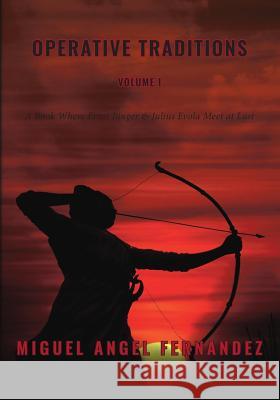Operative Traditions: A Book where Ernst Junger and Julius Evola Meet at Last » książka
Operative Traditions: A Book where Ernst Junger and Julius Evola Meet at Last
ISBN-13: 9780994595867 / Angielski / Miękka / 2017 / 368 str.
Operative Traditions provides a practical and didactic approach to the heritage of the West and the East, focusing on the core values present in traditional craft and art. Through a deep insight into the operative aspects and spiritual character of such disciplines, this book approaches one of the least studied aspects of modern culture: technique and its importance as a key factor for spiritual development.Operative Traditions uncovers the important ideas of one of the most obscure philosophical works of the 20th century: Julius Evola's Theory and Phenomenology of the Absolute Individual. Evola's gnoseological approach draws from the crisis experienced in modern times by Transcendental Idealism (Kant, Hegel, Schelling) and establishes an immanent critique beyond all discursive relativism and speculation. Evola provides the individual with a series of epistemological "tools" that allow the establishment of transcendent immanence: the projection of the core values of Tradition upon the most diverse and complex human realities. The great value of Evola's philosophy resides in its capacity to be directly applied in the most materialistic, reductionist, and highly technological conditions of the 21st century. Operative Traditions studies these technical conditions, aiming to describe the fundamental framework that influences an individual's traits and habits.Operative Traditions also examines The Worker (Der Arbeiter, 1932), one of the most misunderstood works by Ernst JUnger. This serves to provide a new dignity for technique and work, no longer regulating these activities to economic or class-related factors, but instead as opus, a means for forging the diamond brilliance of the spirit.Operative Traditions presents a more appealing and highly artistic vision shared by these figures than is commonly found the political context, instead revealing a creative path where the individual can attain the absolute, persuading all the stars to revolve around him.Operative Traditions offers a multidisciplinary exposition that aims to establish a dialogue between readers who are interested in the metaphysical aspects of Traditionalism and Perennial Philosophy with a broader range readers who are involved in the actual operative conditions of our time. Operative Traditions aims to provide new perspectives, approaches, and disciplines for all those who want to follow Evola's advice of "riding the tiger," here and now, who are no longer content living as "men among the ruins," and want to become men who strive to develop new creations.
Operative Traditions provides a practical and didactic approach to the heritage of the West and the East, focusing on the core values present in traditional craft and art. Through a deep insight into the operative aspects and spiritual character of such disciplines, this book approaches one of the least studied aspects of modern culture: technique and its importance as a key factor for spiritual development.Operative Traditions uncovers the important ideas of one of the most obscure philosophical works of the 20th century: Julius Evola’s Theory and Phenomenology of the Absolute Individual. Evola’s gnoseological approach draws from the crisis experienced in modern times by Transcendental Idealism (Kant, Hegel, Schelling) and establishes an immanent critique beyond all discursive relativism and speculation. Evola provides the individual with a series of epistemological “tools” that allow the establishment of transcendent immanence: the projection of the core values of Tradition upon the most diverse and complex human realities. The great value of Evola’s philosophy resides in its capacity to be directly applied in the most materialistic, reductionist, and highly technological conditions of the 21st century. Operative Traditions studies these technical conditions, aiming to describe the fundamental framework that influences an individual’s traits and habits.Operative Traditions also examines The Worker (Der Arbeiter, 1932), one of the most misunderstood works by Ernst Jünger. This serves to provide a new dignity for technique and work, no longer regulating these activities to economic or class-related factors, but instead as opus, a means for forging the diamond brilliance of the spirit.Operative Traditions presents a more appealing and highly artistic vision shared by these figures than is commonly found the political context, instead revealing a creative path where the individual can attain the absolute, persuading all the stars to revolve around him.Operative Traditions offers a multidisciplinary exposition that aims to establish a dialogue between readers who are interested in the metaphysical aspects of Traditionalism and Perennial Philosophy with a broader range readers who are involved in the actual operative conditions of our time. Operative Traditions aims to provide new perspectives, approaches, and disciplines for all those who want to follow Evola’s advice of “riding the tiger”, here and now, who are no longer content living as “men among the ruins”, and want to become men who strive to develop new creations.











